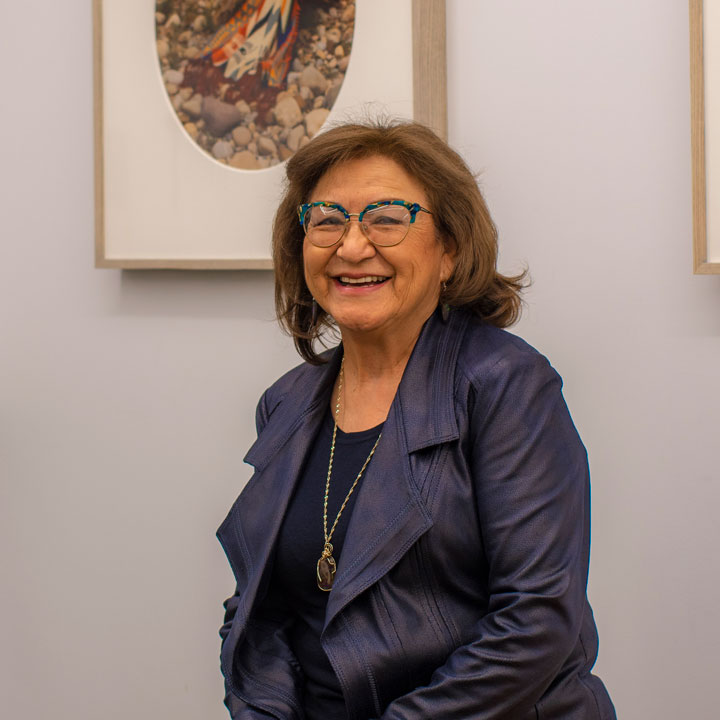
Evelyn Good Striker is a Lakota Dakota from Standing Buffalo First Nation in Saskatchewan and Cheyenne River Sioux Tribe in South Dakota. She grew up experiencing the shifting education policies of the federal government: attending Day School, Residential School, and eventually integrating into a public school at Fort Qu’Appelle, Saskatchewan where she attained a Grade 12 education. Evelyn earned a B. Ed and an M.Ed. from the University of Lethbridge. She has been in the education profession for many years as a classroom teacher and administrator. Evelyn has enjoyed her long career as an educator and cultural advisor. She loves working with students, parents, educators, and anyone who wants to engage in the excitement of learning.
Alice Kaquitts’ Îethka Nakoda name is Yumotata Mani, which translates closely to Grizzly Walker in the English language. She resides on the Stoney Indian Reserve in Morley and is a member of the Goodstoney First Nation. She is a mother, grandmother, knowledge keeper, and interpreter/translator of the Îethka Nakoda language. She currently holds a Social Work Diploma from Mount Royal University and a Bachelor’s Degree in Social Work from the University of Calgary.
Alice has worked in a management capacity in her own community for decades, in addition to providing services to children in care. Alice was involved in the Indian Residential School hearings as an interpreter. She also serves as an elder advisory for the National Gathering of Elders. Over the years, she has been invited by numerous elder advisory groups and organizations to share her knowledge and expertise on the Iethka Nakoda perspective.
Presently, her work consists of consulting, advising, course development, participating on panels, presenting on traditional parenting, history, culture, and the Nakoda language. She also co-hosts a radio talk show every week with Thomas Snow called Conversational Nakoda on CJWE FM 88.1. Alice is also in the process of developing an Îethka Nakoda dictionary with several community members.
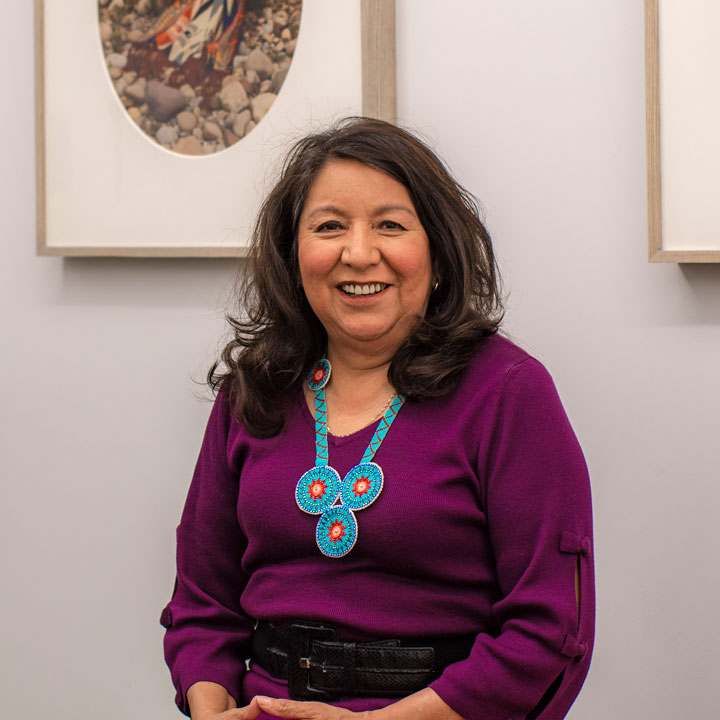
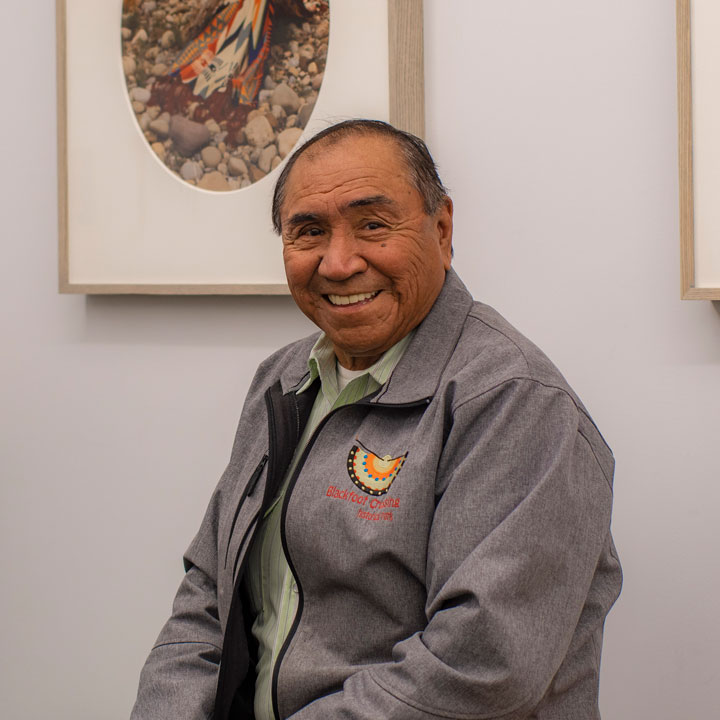
Francis Melting Tallow was born in 1936 on the Siksika Nation to Matthew and Nancy Melting Tallow. His father was from Kainai, his mother Siksika. His childhood name was Bluebird, and later in life, he was given the name Red Bull. Francis was raised by his uncle, Jack Big Eye. Francis learned a lot from Jack, including how to care for cattle and horses, which lead to his lifelong love for ranching and rodeo. He has broken a lot of horses! Jack did not attend residential school, so he had a strong base in traditional culture, which he passed on to Francis.
During his childhood, Indigenous families came from all over Western Canada to work at the coal mines in Siksika, where the common language was English. Francis attended Crowfoot Residential School from 1942-1954. His traditional background and command of the English language prepared him as an interpreter and leader among his friends and schoolmates.
After graduation, Francis attended business school in Edmonton, and then joined the Canadian Air Force for three years. He then returned to the cowboy life before becoming the first employee of Siksika Administration, beginning the operation with half a pencil! After seven years, Francis studied Social Work at the University of Calgary. He then went to work in Thompson, Manitoba at the nickel mine, before moving to Winnipeg where he worked for Native Alcohol Services and Stony Mountain Penitentiary. Returning to Calgary and Siksika, Francis worked for the Indian Association of Alberta and helped form the Treaty Alliance.
Francis has six children and more than twenty grandchildren. He lives with his wife Ruth Scalplock in Cluny. He has many horses and is an avid hunter. Francis wants to see a world where there is a real awareness of Indigenous culture and history, and the effects of colonialism. He hopes for a full rollout of Indigenous control of Child Welfare, the settling of Land Claims, and a time when Indigenous and Western ways live together.
Ruth was born on the Siksika First Nation, east of Calgary. Her Father was Blackfoot and her mother was Cree. She was raised in her traditional culture. As a young child, she was placed in the Indian Residential School, where she suffered much abuse. She survived that experience and the following years of addiction and violence. In 1974, she experienced spiritual reawakening and chose a healing path. She worked in many helping places until she had the vision to address the legacy of her people, working for many years to establish a shelter for Aboriginal women based on a cultural approach. Ruth ran for the position of MLA in southern Alberta in 1992 for the NDP. She then ran and was subsequently elected as a Band Councillor at Siksika Nation, where she sat for 18 years. In 2014, she released her book titled My Name Is Shield Woman: A Hard Road to Healing, Vision and Leadership.
Today, Ruth is a healer, community builder, and Elder. She is currently involved in the issue of Murdered and Missing Indigenous Women in Canada.
Ruth is a voice for cross-cultural understanding and forgiveness, as the beginning of reconciliation of the past and building the future.
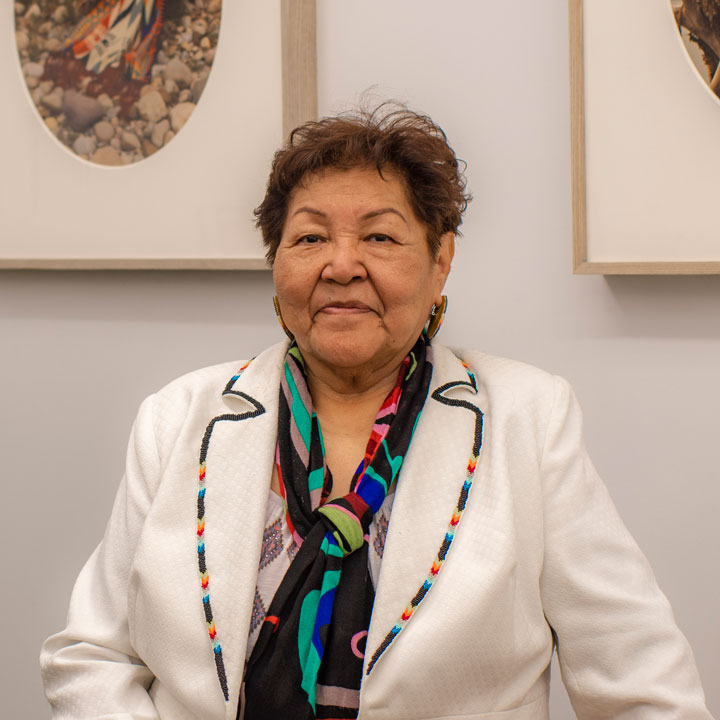
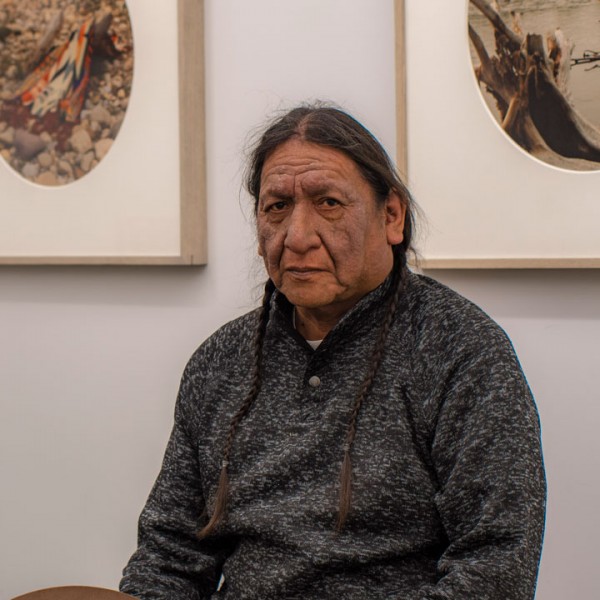
Clarence Wolfleg Sr. (Agar) is from the Siksika Nation. His traditional name, Miiksika'am, translates to “Red Crane.” This traditional Siksika name was also his fourth great grandfather’s name, who watched their eastern Siksika boundaries for many years back in the late 1700s.
Clarence attended the Old Sun Indian Residential School in Siksika and was registered by the name Agar Wolfleg. He later used his correct name, Clarence Victor Wolfleg, which came from his god father, a Siksika Chief named Chief Clarence McHugh. Clarence McHugh’s wife’s name was Victoria.
In 2013, Clarence finished his last term with Siksika Nation Chief & Council. He was elected for ten terms as a member of Siksika Council and served under many Siksika chiefs.
Clarence is a member of the Sacred Horns’ Society (Transfer of Sacred Bundle 2015) and the Brave Dog Society, which are traditional Blackfoot Societies. He is a five-year veteran of International Peace Keeping (NATO & UN) in the mid 1960s. Upon his return from the Peace Keeping Initiative, he became a police officer and served 14 years as RCMP Supernumerary Constable, and later as Alberta Special Constable.
Clarence also served as Chief of Police for the Siksika Nation and worked for Corrections Canada. He was also employed with the Native Counselling Services of Alberta (Native Programs Coordinator, Southern Alberta Area Supervisor) and was one of the first AADAC Outpatient Directors and trained through Nechi (Addictions Counsellor).
Presently Clarence is recognized as a Siksika Traditional Spiritual Leader by Siksika Nation and is a spiritual advisor (Elder) at MRU, BVC (Iniikokaan Centre), Sunrise Addiction Services, Heritage Park, Calgary Board of Education, SAIT, and City of Calgary.
On November 5, 2020, Clarence was honoured by MRU with an Honorary B.A. in Sociology, and in 2021, Clarence was honored again from MRU with an honorary Doctorate of Law.
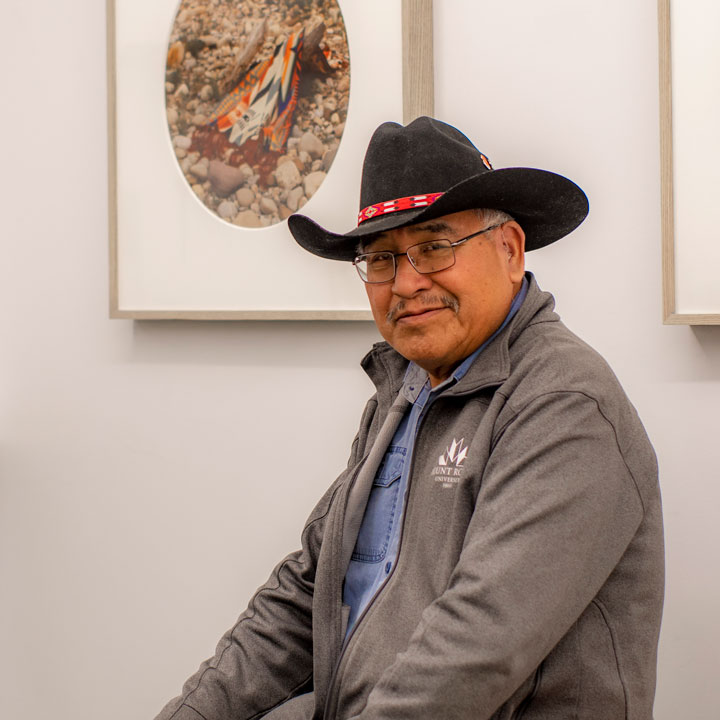
Adrian’s research and subsequent writings have formed foundational documents on Indigenous homelessness in Calgary and Edmonton. Published internationally, he has educated tens of thousands of individuals about Aboriginal Peoples’ history, culture, and protocols as an Educator, Executive Director, and Elder. A personal highlight for Adrian was providing cultural guidance and expertise to the Canadian, French, and Belgian governments for the 2005 Aboriginal Calling Home Ceremony.